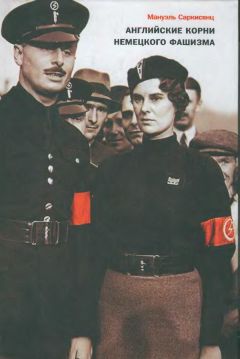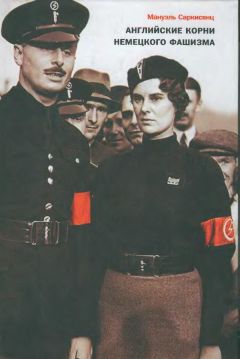Мануэль Саркисянц - Английские корни немецкого фашизма: от британской к австро-баварской «расе господ».
226
119e. Advertisement for the Inexperienced Planters of New England (London, 1631), pp. 15f, quoted in Evans, Milton's Imperial Epic, p. 18.
227
119f. Evans, pp. 18, 20.
228
119g. John Milton, "On Reformation… Discipline in England" (1644): Milton, Complete Prose Works, Vol. I, (New Haven, USA, 1953), pp. 616–617; W. T. Stead, Last Will and Testament of Cecil Rhodes. Political and religious ideas of the Testator (London, 1902), p. 100.
229
119h. C. A. Weber, Englische Kulturideologie, Bd. I, (Stuttgart, 1941), S. 128f, 28, 196ff: F. Giese und H. Gerber, "Religion und Politik in England"; Drascher, Vorherrschaft der weissen Rasse, S. 206f; David Armitage, Ideological origins of the British Empire (Cambridge, 2000), p. 99.
230
120. Drascher, Vorherrschaft der weissen Rasse, S. 206f.
231
120a. F. Brie, Imperialistische Stromungen in der englischen Literatur (1928), S. 239, 240; Hans Kohn, Idee des Nationalismus. Ursprung und Geschichte (Heidelberg, 1950), S.851; R. Mac Donald, Language of Empire, p. 155.
232
120b. R. MacDonald, Language of Empire, p. 141.
233
120c. Alain and Cairns, Prelude to Imperialism, p. 242.
234
121. Hannah Arendt, Ursprunge und Elemente totaler Herrschaft (Frankfurt, 1955), S. 318f.
235
122. Wilhelm Dibelius, England (Leipzig, 1929), II. Halbband, S. 71; J. Morley, Life of Cobden, p. 674.
236
123. Sir John Kaye, The Administration of the West India Company (London, 1853), p. 660.
237
124. Hugh E. Egerton, Short history of British colonial policy (London, 1897), p. 496, zitiert nach Hans Kohn, Die Idee des Nationalismus. Ursprung und Geschichte bis zur Franzosischen Revolution (Heidelberg, 1950), S. 852.
238
125. H. Kohn, ibid., S. 852.
239
126. Max Weber, The Protestant Ethics and the spirit of Capitalism, Translated by T. Parsons (London, 1968), p. 104, 122.
240
127. Dibelius, England II. Halbband, S. 72, 70.
241
128. Wilhelm Muhlmann, Chiliasmus und Nativismus. Studien zur Psychologie, Soziologie und historischen Kasuistik der Umsturzbewegungen (Heidelberg, 1961), S. 404.
242
129. Dibelius, England, II, S. 75, 201.
243
130. Ibid., S. 76.
244
131. Werner Roder, Deutsche sozialistische Exilgruppen in Grossbritannien 1940–1945 (Godeberg, 1973), S. 186–187.
245
132. Vgl. Manfred Messerschmidt & Fritz Wallner, Die Wehrmachtsjustiz im Dienste des Nationalsozialismus (Baden-Baden, 1987), S. 260f, 27If.
246
132a. Hans W. Thost, Als Nationalsozialist in England (Munchen, 1939), S. 255.
247
133. ARD (Fernsehen) "Politmagazin Panorama" des NDR vom 12, September 1996, 21, 10 Uhr; Ian Slater and Douglas Batting, Nazi Gold. The story of the Grid's greatest Robbery — and its Aftermath (Edinburgh, 1998), pp. 337, 340, 342f, 349f, 353.
248
134. Hans Grimm, Heynade und England, Buch I, S. 83.
249
135. Carl Peters, Die Grundung von Deutsch-Ostafrika, S. 136.
250
136. Hans Grimm, Heynade und England, Buch III. Vgl. Neville Chamberlain on 1. November 1938: House of Commons, Debates, Bd. CCCXL, Col. 74, 88 in D. Aigner (wie Anm. 895) S. 334, 402.
251
136a. Carl Peter, England und die Englander (Hamburg, 1915), S. 121.
252
137. Hitlers Tischgesprache (vom 18. April 1942, abends) im Fuhrerhauptquartier. Aufgezeichnet von Henry Picker. Hrsg. von Percy Ernst Schramm (Stuttgart, 1965), S. 280. Пикер. С. 209.
253
137a. Bill Schwarz (Editor), Expansion of England. Race, ethnicity and cultural history (London, 1996), p. 251; James Morgan Read, Atrocity Propaganda (New York, 1972), pp.29ff, 35, 37, 44, 49, 53.
254
137b. James Froude's novel "Cyril or Oceana" (1889), Chapter XVIII, cited by F. Brie, Imperialistische Stromungen in der englischen Literatur (Halle, 1928), S. 167.
255
137c. Max Scheler, Der Genius des Krieges und der deutsche Krieg (Leipzig, 1915), S. 408:"Zur Psychologie des englischen Ethos und des cant".
256
137d. Peter Marsch (Editor), The Conscience of the Victorian State (Syracuse, N. Y, USA,1979), p. 2.
257
138. E. Wingfield-Stratford, History of British Patriotism (London, 1913), Vol. I, p. xxxiv, xxxvi f, xxiii.
258
139. The British Image of India, p. 131.
259
140. Josiah Strong, The times and young men (New York, 1901), quoted in: Gossett, Race. History of an idea in America (New York, 1969), p. 187.
260
141. Josiah Strong, Our Country. Its possible future and its present crises (New York, 1895), quoted in: Gossett, ibid., p. 190.
261
142. Gossett, ibid., p. 178, 185.
262
143. Flora Annie Steel, On the face of the Waters. A tale of the Indian mutiny (London, 1897), p. 2, angefuhrt bei Greenberger, The British Image of India, p. 13.
263
144. Robert Knox, The Races of Men (1850): Mac Dougal, Racial Myth in English history, S. 91.
264
145. Sir Charles Dilke, Greater Britain (London, 1894), p. 564; Greater Britain (edition of 1869), p. 230, 572f.
265
146. J. A. Cramb, Origins and Destiny of Imperial Britain (London, 1900): Patrick von zur Muhlen, Rassenideoiogie, Geschichte und Hintergrunde (Berlin, 1977), S. 216.
266
147. Dennis Kincaid, British social life in India (London, 1973), p. xiii, 213.
267
148. K. Lun & Richard Thurlaw (Editors), British Fascism (London, 1980), p. 168–186: Paul Hayes, "The contribution of British intellectuals to fascism"; F. W. Hirst & G. Murray & J. L. Hammond, Liberalism and Empire (London, 1900), S. 152, 171ff.
268
149. Konstantin Pobedonoscev, Moskovskij Sbornik (Moskau, 1901), p. 240–242; Daniel P. Todes, Darwin without Malthus. The struggle for existence in Russian evolutionary thought (New York, 1989), pp. 19, 41, цит по: Данилевский. Дарвинизм. Критическое обозрение. СПб., 1885. Т. I. С. 478.
269
150. Lean Poliakov, The Aryan Myth. A. History of racist and nationalist ideas in Europe (London, 1971), p. 298.
270
151. Herbert Spencer, Social Statics or the Conditions essential for human happiness (London, 1851), p. 31 If, 314f, 321ff, 416f; Houghton, Victorian… mind, p. 139f.
271
152. David Duncan (Editor), Life and Letters of Herbert Spencer (New York, 1908), II, p. 16f: Spencer's letter of 26. August 1892 to Kentaro Kaneko.
272
152a. Stefan Kiihl, The Nazi Connection. Eugenics, American Racism and German National Socialism (Oxford, 1994), pp. XIV, 72; Stefan Kuhl, Internationale der Rassisten (Frankfurt, 2000), pp. 122 ff; cf. ibid., pp. 18, 41.
273
153. Cf. Hugh Mac Dougal, Racial Myth in English History, p. 97.
274
154. Hannah Arendt, Ursprunge… totaler Herrschaft, S. 290; Bernard Semmel, Imperialism and social reform, English Social-Imperial thought 1895–1914 (London, 1960), p. 42, 44, 49.
275
155. Francis Galton, Hereditary Genius (New York, 1891), p. 338f, 346, cited in Gossett, Race… in America, p. 155–156; Semmel, p. 47.
276
156. Muhlen, Rassenideologien, S. 240; American Historical Review, Vol. CVI, No. 4 (October, 2001), p. 1481, review of Pascal Grosse, Kolonialismus, Eugenikund burgerliche Gesselschaft in Deutschland 1850–1918. Campus Forschung. No. 815 (New York, 2000); Lothar Stengel von Rutkowski, Was ist ein Volk? Der biologische Xfolksbegriff (Erfurt, 1943).
277
157. Unveroffentlichte Rede Hitlers vom 22. Juni 1944, gehalten vor Offiziersanwartern, zitiert nach Christian Zentner: Adolf Hitler, Mein Kampf. Kommentierte Auswahl (1974), S. 225.
278
158. Emil Brix (Hrsg.), Ludwig Gumplowicz oder Die Gesellschaft als Natur (Koln, 1986), S. 25; Ludwig Gumplowicz, Grundriss der Soziologie (Wien, 1905), S. 139, 76, 78, 198.
279
159. Ibid., S. 195.
280
160. Ibid., S. 78.
281
161. Benjamin Kidd, Soziale Evolution. Deutsche Ubersetzung (Jena, 1895), S. 155, 156.
282
162. Lunn & Thurlaw, British Fascism, p. 178: Paul Hayes, "Contributions of British intellectuals to Fascism».
283
163. Benjamin Kidd, The Science of Power (London, 1918), p. 294.
284
164. Benjamin Kidd, Social Evolution (London, edition of 1898), p. 280.
285
165. Lunn & Thurlaw, British Fascism, p. 178.
286
166. Karl Pearson, National Life from the standpoint of Science (London, 1901), p. 19, quoted in Paul Hayes, "Contributions of British intellectuals to Fascism": Lunn & Thurlaw, British Fascism. S. 176f; Bernard Semmel (as note 154), p. 4If, 44, 49f; Jonathan Rutherford, Forever England, Reflections on Masculinity and Empire (London, 1997), p. 55; G. R. Searle, The Quest for National Efficiency. A study in British politics and political thought 1899–1914 (Oxford, 1971), p. 96.
287
167. Patrick von zur Muhlen, Rassenideologien. Geschichte und Hintergrund (Berlin, 1977), S. 98, 215.
288
168. Friedrich Nietzsche, "Frohliche Wissenschaft": Aphorismus 349: Werke, Band II (Munchen, 1966), S. 215; Веселая наука / Пер. M. Кореневой. // Ницше Ф. Стихотворения. Философская проза. СПб., 1993. С. 475.
289
169. Muhlen, Rassenideologien, S. 85 unter Anfuhrung von: John Berry Haycraft, Darwinism and Race Progress (London, 1895).
290
170. Muhlen, ibid., S. 85.
291
170a. Robert Knox, Races of Men (London, 1850), p. V; S. Kiihl, Internationale der Rassisten (1994), S. 25.
292
171. Thost, Als Nationalsozialist in England (Munchen, 1939), S. 99; Thurlow, Fascism in Britain (London, 1982), p. 276; Hannah Arendt, Elemente… totaler Herrschaft, S. 288.
293
172. Ibid., S. 288; Weir and Boyle, "Human Rights in the United Kingdom": The Political Quarterly, Vol. LXVIII, № 2 (April/June, 1997), p. 128; Michael Levin, in: American Historical Review, Vol. CV, No I (2000), p. 279; cf. Alan Ereira, People's history of England (London, 1981), p. 41, 50, 56f, 62, 67.
294
172a. Don Herzog, Poisoning the mind of the Lower Orders (Princeton, 1998), p. 513; R. Baden-Powell, Scouting for Boys (London, 1908), p. 200; Politics for the People vom 6. Mai 1848, reprinted in: Joel H. Wiener (Editor), Great Britain. The Lion at Home. A documentary history of domestic policy 1689–1973, Vol. II (New York, 1983), p. 228, 230, 239f.
295
49. H. Picker (Hrsg.), Hitlers Tischgesprache (Stuttgart, 1976), S. 456f: Tischgesprache vom Abend des 24. Juli 1942. Vgl Peter Schwind-Waldeck, Wie deutsch war Hitler? (Frankfurt, 1979), S.12, 210 und Alfred D. Low, Jews in the eyes of the German, From the Enlightenment to Imperial Germany (Philadelphia, 1979), p. 52.
296
173. Don Herzog, p. 480, quoting "John Bull" of 11. May, 1834, p. 149; Ross McKibbin, Class and Culture. England 1918–1957 (1998), pp. 530f; Hannah Arendt, Elemente… totaler Herrschaft, S. 289; Walter Bagehot, The English Constitution (Glasgow, 1975), p. 265–269.
297
174. Carl Peters, England und die Englander, S. 154–155.




